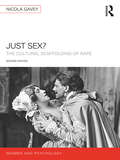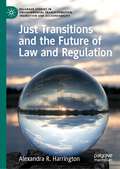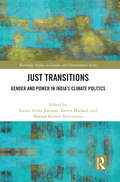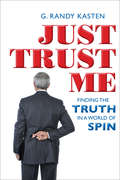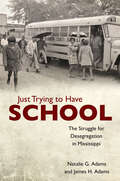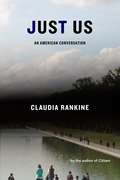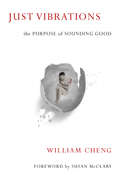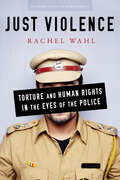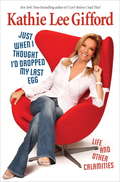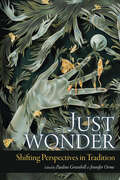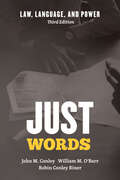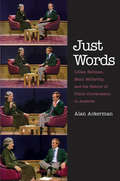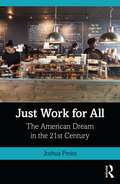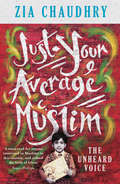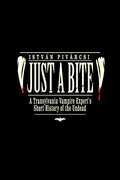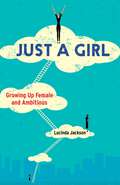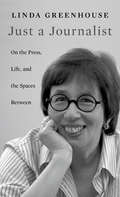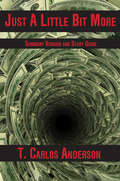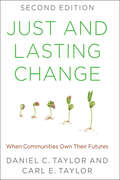- Table View
- List View
Just Sex?: The Cultural Scaffolding of Rape (Women and Psychology)
by Nicola GaveyIn the award-winning Just Sex? The Cultural Scaffolding of Rape, Nicola Gavey provides an extensive commentary on the existing literature on rape, analysing recent research to examine the psychological and cultural conditions of possibility for contemporary sexual violence. Just Sex? argues that feminist theory on sexual victimization has gone both too far and not far enough. It presents the reader with a challenging and original perspective on the issues of rape, sex and the body, incorporating new material on sexism, misogyny and digital culture, as well as debates over gendered analyses of sexual violence. The second edition has been updated and expanded to be extremely timely and relevant, with the most recent high-profile rape cases – the Stanford rape case and the Belfast rape case – being tried in the media and online. The rise of the Hollywood Harvey Weinstein scandal and the #MeToo movement makes this book incredibly useful and necessary to those who are working within the area of sexual violence. This will appeal to academic readers studying psychology, sociology, and criminology, as well as those looking into cultural influences on society. It will also be very useful to those working in the professional sector on prevention and with people who have been subjected to sexual violence.
Just Tell Me When We're Dead!
by Eth CliffordJeffrey Post runs away to the island and so his cousins -- sisters Mary Rose and Jo-Beth find themselves in an unexpected adventure as they search for him.
Just Transitions and the Future of Law and Regulation (Palgrave Studies in Environmental Transformation, Transition and Accountability)
by Alexandra R. HarringtonThis book provides a comprehensive assessment of how national and international efforts to achieve carbon neutrality have been embraced as necessary to meet the requirements of the Paris Agreement as well as the needs of the planet. The authors explore the increasing tensions between aspirations and entrenched practices as methods to implement carbon neutrality are devised, particularly at the national and sub-national levels. This is perhaps best typified by efforts to shift from “dirty” energy production, such as coal, to greener alternatives, which are often supported in laws and rules but opposed by society. To bridge this void, the concept of just transitions has increasingly come to the forefront of international and national focus yet is often poorly understood. This book examines the ways in which just transitions have been proposed as a legal and regulatory bridge to address issues that result in societal resistance to implementation. It uses past and existing practice studies of just transitions before providing an analysis of how just transitions can be used to not only to assist in the shift to carbon neutrality but also in new shifts such as those caused by the Covid-19 pandemic impacts on economy, environment and society, and to address future global challenges.
Just Transitions: Gender and Power in India’s Climate Politics (Routledge Studies in Gender and Environments)
by Seema Arora-Jonsson Kavya Michael Manish Kumar ShrivastavaThis book turns critical feminist scrutiny on national climate policies in India and examines what transition might really mean for marginalized groups in the country. A vision of “just transitions” is increasingly being used by activists and groups to ensure that pathways towards sustainable futures are equitable and inclusive. Exploring this concept, this volume provides a feminist study of what it would take to ensure just transitions in India where gender, in relation to its interesting dimensions of power, is at the centre of analysis. With case studies on climate mitigation and adaptation from different parts of India, the book brings together academics, practitioners and policymakers who provide commentary on sectors including agriculture, forestry and renewables. Overall, the book has relevance far beyond India’s borders, as India’s attempt to deal with its diverse population makes it a key litmus test for countries seeking to transition against a backdrop of inequality both in the Global North and South. This volume will be of great interest to students and scholars of climate policy, gender studies, sustainable development and development studies more broadly.
Just Trust Me
by G Randy KastenSUVs are the safest vehicle because they're so large-right? Wrong! That's the advertising pitch, but in 2000, they had the highest rollover rate (36%) of any vehicle type involved in fatal accidents. Yet two years later their safety myth was still so strong that one of four vehicles sold in the U. S. was an SUVThe world of spin we live in is full of such potentially hazardous illusions. We need to know if particular foods can hurt us with Salmonella or cholesterol, whether our government is truthful in its reasons for waging war, what problems a political candidate may cause or resolve if elected, and whether the items we purchase are durable or junk. But gaining those insights can be challenging when so many of the illusions surrounding us are deliberately created. As a civil-litigation attorney for over twenty-five years, Randy Kasten has heard thousands of lies. He has witnessed that those who dispense the information we need to make decisions-advertisers, salespeople, politicians, and the media-often have a vested interest in manipulating us. Truth's biggest enemies are the people whose job it is to sell us incomplete versions of the facts and our willingness to believe what we want to believe. Often, we believe what we believe because it is the only story available.To help us see through deceptions of all types, Kasten discusses eight kinds of lies and what we can do about them, as well as methods for discerning the truth gleaned from his practice of law. Other topics include advertising magic, thirty-six places where the truth hides, lessons from science, the media and misinformation, and how we fool ourselves. Altogether, he provides a unique tool for enabling us to make decisions that will lead to more prosperity, better health, greater intimacy, and a life based on lasting values
Just Trust Me
by G. Randy KastenSUVs are the safest vehicle because they're so large-right? Wrong! That's the advertising pitch, but in 2000, they had the highest rollover rate (36%) of any vehicle type involved in fatal accidents. Yet two years later their safety myth was still so strong that one of four vehicles sold in the U. S. was an SUV. The world of spin we live in is full of such potentially hazardous illusions. We need to know if particular foods can hurt us with Salmonella or cholesterol, whether our government is truthful in its reasons for waging war, what problems a political candidate may cause or resolve if elected, and whether the items we purchase are durable or junk. But gaining those insights can be challenging when so many of the illusions surrounding us are deliberately created. As a civil-litigation attorney for over twenty-five years, Randy Kasten has heard thousands of lies. He has witnessed that those who dispense the information we need to make decisions-advertisers, salespeople, politicians, and the media-often have a vested interest in manipulating us. Truth's biggest enemies are the people whose job it is to sell us incomplete versions of the facts and our willingness to believe what we want to believe. Often, we believe what we believe because it is the only story available.To help us see through deceptions of all types, Kasten discusses eight kinds of lies and what we can do about them, as well as methods for discerning the truth gleaned from his practice of law. Other topics include advertising magic, thirty-six places where the truth hides, lessons from science, the media and misinformation, and how we fool ourselves. Altogether, he provides a unique tool for enabling us to make decisions that will lead to more prosperity, better health, greater intimacy, and a life based on lasting values.
Just Trying to Have School: The Struggle for Desegregation in Mississippi
by Natalie G. Adams James H. AdamsAfter the 1954 Brown v. Board of Education ruling, no state fought longer or harder to preserve segregated schools than Mississippi. This massive resistance came to a crashing halt in October 1969 when the Supreme Court ruled in Alexander v. Holmes Board of Education that "the obligation of every school district is to terminate dual school systems at once and to operate now and hereafter only unitary schools." Thirty of the thirty-three Mississippi districts named in the case were ordered to open as desegregated schools after Christmas break. With little guidance from state officials and no formal training or experience in effective school desegregation processes, ordinary people were thrown into extraordinary circumstances. However, their stories have been largely ignored in desegregation literature. Based on meticulous archival research and oral history interviews with over one hundred parents, teachers, students, principals, superintendents, community leaders, and school board members, Natalie G. Adams and James H. Adams explore the arduous and complex task of implementing school desegregation. How were bus routes determined? Who lost their position as principal? Who was assigned to what classes? Without losing sight of the important macro forces in precipitating social change, the authors shift attention to how the daily work of "just trying to have school" helped shape the contours of school desegregation in communities still living with the decisions made fifty years ago.
Just Us: An American Conversation
by Claudia RankineFINALIST FOR THE 2021 ANDREW CARNEGIE MEDAL FOR EXCELLENCE IN NONFICTIONClaudia Rankine’s Citizen changed the conversation—Just Us urges all of us into itAs everyday white supremacy becomes increasingly vocalized with no clear answers at hand, how best might we approach one another? Claudia Rankine, without telling us what to do, urges us to begin the discussions that might open pathways through this divisive and stuck moment in American history.Just Us is an invitation to discover what it takes to stay in the room together, even and especially in breaching the silence, guilt, and violence that follow direct addresses of whiteness. Rankine’s questions disrupt the false comfort of our culture’s liminal and private spaces—the airport, the theater, the dinner party, the voting booth—where neutrality and politeness live on the surface of differing commitments, beliefs, and prejudices as our public and private lives intersect.This brilliant arrangement of essays, poems, and images includes the voices and rebuttals of others: white men in first class responding to, and with, their white male privilege; a friend’s explanation of her infuriating behavior at a play; and women confronting the political currency of dying their hair blond, all running alongside fact-checked notes and commentary that complements Rankine’s own text, complicating notions of authority and who gets the last word.Sometimes wry, often vulnerable, and always prescient, Just Us is Rankine’s most intimate work, less interested in being right than in being true, being together.
Just Vibrations: The Purpose of Sounding Good
by Susan Mcclary William ChengModern academic criticism bursts with what Eve Kosofsky Sedgwick once termed paranoid readings--interpretative feats that aim to prove a point, persuade an audience, and subtly denigrate anyone who disagrees. Driven by strategies of negation and suspicion, such rhetoric tends to drown out softer-spoken reparative efforts, which forego forceful argument in favor of ruminations on pleasure, love, sentiment, reform, care, and accessibility. Just Vibrations: The Purpose of Sounding Good calls for a time-out in our serious games of critical exchange. Charting the divergent paths of paranoid and reparative affects through illness narratives, academic work, queer life, noise pollution, sonic torture, and other touchy subjects, William Cheng exposes a host of stubborn norms in our daily orientations toward scholarship, self, and sound. How we choose to think about the perpetration and tolerance of critical and acoustic offenses may ultimately lead us down avenues of ethical ruin--or, if we choose, repair. With recourse to experimental rhetoric, interdisciplinary discretion, and the playful wisdoms of childhood, Cheng contends that reparative attitudes toward music and musicology can serve as barometers of better worlds.
Just Violence: Torture and Human Rights in the Eyes of the Police
by Rachel WahlPolice who engage in torture are condemned by human rights activists, the media, and people across the world who shudder at their brutality. Stark revelations about torture by American forces at places like Guantanamo Bay have stoked a fascination with torture and debates about human rights. Yet despite this interest, the public knows little about the officers who actually commit such violence. How do the police understand what they do? How do their beliefs inform their responses to education and activism against torture? Just Violence reveals the moral perspective of perpetrators and how they respond to human rights efforts. Through interviews with law enforcers in India, Rachel Wahl uncovers the beliefs that motivate officers who use and support torture, and how these beliefs shape their responses to international human rights norms. Although on the surface Indian officers' subversion of human rights may seem to be a case of "local culture" resisting global norms, officers see human rights as in keeping with their religious and cultural traditions—and view Western countries as the primary human rights violators. However, the police do not condemn the United States for violations; on the contrary, for Indian police, Guantanamo Bay justifies torture in New Delhi. This book follows the attempts of human rights workers to both persuade and coerce officers into compliance. As Wahl explains, current human rights strategies can undermine each other, leaving the movement with complex dilemmas regarding whether to work with or against perpetrators.
Just When I Thought I'd Dropped My Last Egg
by Kathie Lee GiffordJust When I Thought I'd Dropped My Last Eggis Kathie Lee Gifford's triumphant laugh-out-loud celebration of forging ahead with gusto, even long after we're old enough to know better. Age, after all, isn't a number, it's a state of mind, and being fertile isn't just about having babies, it's about being passionate and creative. Writing with the candor of a friend who knows where the bodies are buried, Kathie Lee reveals the truth every woman of a certain age knows but won't admit: that we love our kids every second of every day but are counting the minutes till they're ready to go off to college, that even though gravity is a constant force, not all parts of our bodies droop at the same rate, and that life and show business share one simple rule: "Don't sit by the phone and wait for a man or a job. " Full of warmth, humor, and down-to-earth wisdom, this wonderful book is a delectable read for grown-ups of all ages.
Just When I Thought I'd Dropped My Last Egg
by Kathie Lee GiffordJust When I Thought I'd Dropped My Last Egg is Kathie Lee Gifford's triumphant laugh-out-loud celebration of forging ahead with gusto, even long after we're old enough to know better. Age, after all, isn't a number, it's a state of mind, and being fertile isn't just about having babies, it's about being passionate and creative. Writing with the candor of a friend who knows where the bodies are buried, Kathie Lee reveals the truth every woman of a certain age knows but won't admit: that we love our kids every second of every day but are counting the minutes till they're ready to go off to college, that even though gravity is a constant force, not all parts of our bodies droop at the same rate, and that life and show business share one simple rule: "Don't sit by the phone and wait for a man or a job." Full of warmth, humor, and down-to-earth wisdom, this wonderful book is a delectable read for grown-ups of all ages.
Just When I Thought I'd Dropped My Last Egg
by Kathie Lee GiffordJust When I Thought I'd Dropped My Last Egg is Kathie Lee Gifford's triumphant laugh-out-loud celebration of forging ahead with gusto, even long after we're old enough to know better. Age, after all, isn't a number, it's a state of mind, and being fertile isn't just about having babies, it's about being passionate and creative. Writing with the candor of a friend who knows where the bodies are buried, Kathie Lee reveals the truth every woman of a certain age knows but won't admit: that we love our kids every second of every day but are counting the minutes till they're ready to go off to college, that even though gravity is a constant force, not all parts of our bodies droop at the same rate, and that life and show business share one simple rule: "Don't sit by the phone and wait for a man or a job." Full of warmth, humor, and down-to-earth wisdom, this wonderful book is a delectable read for grown-ups of all ages.
Just Wonder: Shifting Perspectives in Tradition
by Pauline Greenhill Jennifer OrmeInspired by folklore, television, fairy tales, social media, novels, and films, Just Wonder addresses crucial themes in social and ecological justice efforts. Moving into the mid-twenty-first century, wonder—as a potentially critical sociocultural, ecological, and individual stance—will play a significant role in reconceptualizing the present to imagine a different and better world. These essays examine fairy tales and other traditional forms of the fantastic and the real to offer alternative expressions of justice relevant to gender, sex, sexuality, environment, Indigeneity, class, ability, race, decolonizing, and human and nonhuman relations. By analyzing fairy tales and wonder texts from various media through an intersectional feminist lens, Pauline Greenhill and Jennifer Orme consider how wonder genres and forms blend with diverse conceptions of seeking and enacting justice. International collaborators—both established and emerging scholars who self-identify with different subjectivities, locations, and generations and come from an impressive range of inter/disciplines—engage with contemporary and historical texts from various languages and cultural contexts, including interventions, counterparts, and comparisons to the fairy tale. Just Wonder offers a critical look at how creative wondering can expand the ability to resist modes of oppression while fostering equity, as well as encourage curiosity and imagination. In a world that can be overwhelming and precarious, this book presents scholarly, artistic, personal, and collective-action interventions to identify and respond to injustice while centering wonder and, thus, imagination, questioning, and hope. Just Wonder will appeal to fairy-tale scholars; folklorists; students and scholars of film, media studies, and cultural studies; as well as a general audience.
Just Words: Law, Language, and Power (Chicago Series in Law and Society)
by Robin Conley Riner John M. Conley William M. O'BarrIs it “just words” when a lawyer cross-examines a rape victim in the hopes of getting her to admit an interest in her attacker? Is it “just words” when the Supreme Court hands down a decision or when business people draw up a contract? In tackling the question of how an abstract entity exerts concrete power, Just Words focuses on what has become the central issue in law and language research: what language reveals about the nature of legal power. John M. Conley, William M. O'Barr, and Robin Conley Riner show how the microdynamics of the legal process and the largest questions of justice can be fruitfully explored through the field of linguistics. Each chapter covers a language-based approach to a different area of the law, from the cross-examinations of victims and witnesses to the inequities of divorce mediation. Combining analysis of common legal events with a broad range of scholarship on language and law, Just Words seeks the reality of power in the everyday practice and application of the law. As the only study of its type, the book is the definitive treatment of the topic and will be welcomed by students and specialists alike. This third edition brings this essential text up to date with new chapters on nonverbal, or “multimodal,” communication in legal settings and law, language, and race.
Just Words: Lillian Hellman, Mary Mccarthy, and the Failure of Public Conversation in America
by Alan AckermanIn an appearance on The Dick Cavett Show in 1980, the critic Mary McCarthy glibly remarked that every word author Lillian Hellman wrote was a lie, "including 'and' and 'the.'" Hellman immediately filed a libel suit, charging that McCarthy's comment was not a legitimate conversation on public issues but an attack on her reputation. This intriguing book offers a many-faceted examination of Hellman's infamous suit and explores what it tells us about tensions between privacy and self-expression, freedom and restraint in public language, and what can and cannot be said in public in America.
Just Work for All: The American Dream in the 21st Century
by Joshua PreissThis is a book about the American Dream: how to understand this central principle of American public philosophy, the ways in which it is threatened by a number of winner-take-all economic trends, and how to make it a reality for workers and their families in the 21st century. Integrating political philosophy and the history of political thought with recent work in economics, political science, and sociology, this book calls for renewed political and policy commitment to “just work.” Such a commitment is essential to combat the negative moral externalities of an economy where the fruits of growth are increasingly claimed by a relatively small portion of the population: slower growth, rising inequality, declining absolute mobility, dying communities, the erosion of social solidarity, lack of faith in political leaders and institutions, exploding debt, ethnic and nationalist backlash, widespread hopelessness, and the rapid rise in what economists Angus Deaton and Anne Case call deaths of despair. Covid-19 threatens to pour gasoline on these winner-take-all fires, further concentrating economic and political power in the hands of those best suited to withstand (and even profit from) the pandemic-driven economic crisis. In this book, the author provides a model for understanding the American Dream and making it a reality in a post-Covid-19 economy. A tour de force, this book is essential reading for scholars and researchers of political philosophy, political economy, political theory, and economics, as well as for the layperson trying to make sense of the post-pandemic world.
Just Your Average Muslim
by Zia ChaudhryToo often we see Islam and Muslims portrayed as fanatical jihadists or helpless victims of western oppression. This book provides a rare insight into what, as the book"s title states, the average Muslim makes of it all.
Just Your Average Muslim
by Zia ChaudhryToo often we see Islam and Muslims portrayed as fanatical jihadists or helpless victims of western oppression. This book provides a rare insight into what, as the book"s title states, the average Muslim makes of it all.
Just a Bite
by Istvan PivarcsiMustering his extensive experience on the scene of the world's richest source of vampire lore, Transylvania, historian and author István Pivárcsi seeks to peel away the effects of popular culture and set the record straight, addressing essential questions in dozens of bite-size chapters: How did vampire legends emerge in the Balkans, Romania, and Transylvania? How did other monsters eventually coalesce as what we know as vampires? Who was the real Vlad the Impaler, and how did he come to personify the classic vampire? How did vampire-related oral traditions evolve over the centuries--and then explode with unprecedented force in both literature and popular culture from the mid-nineteenth century on? The ideal short reference for anyone with at least a passing interest in the undead, Just a Bite includes an extensive two-part appendix comprising a comprehensive glossary of vampire terms as well as a chronology of human beings' fascination (and interaction) with vampires through history.
Just a Girl: Growing Up Female and Ambitious
by Lucinda JacksonJust A Girl is the sensitive, personal story of the author’s ambition to become and succeed as a scientist during the “white man in power” era of the 1950s to 2010s. In the male-dominated science world, she struggles from girlhood unworthiness to sexist battles in jobs on the farms and in the restaurants of America, in academia’s laboratories and field research communities, and in the executive corner office. Jackson overcomes pain, shame, and self-blame, learns to believe in herself when others don’t, and becomes a champion for others. The turbulent legal and social background of sexual harassment and sexism in America over seven decades is delivered as “history with emotion.” Just a Girl is also a call to action: it identifies the court cases and lawsuits that helped advance the cultural changes we see today; outlines the pressing need for a Boys and Men Liberation (BAML) movement; highlights new approaches by parents; advocates for changes in our universities; and suggests a different direction for corporate America to take to stop the cycle of sexual harassment. Eye-opening and inspiring, it points the way to a brighter future for women everywhere.
Just a Journalist: On the Press, Life, and the Spaces Between (The William E. Massey Sr. lectures in American studies ; #2015)
by Linda GreenhouseA Pulitzer Prize–winning reporter who covered the Supreme Court for The New York Times, Linda Greenhouse trains an autobiographical lens on a moment of transition in U.S. journalism. Calling herself “an accidental activist,” she raises urgent questions about the role of journalists as citizens and participants in the world around them.
Just a Little Bit More: The Culture of Excess and the Fate of the Common Good
by T. Carlos AndersonIs America a Christian Nation? According to author T. Carlos Andersen, the true religion of the land is the confluence of commerce, materialism, and consumerism. Andersen, defining religion as "ultimate concern," claims our true devotion is found in material pursuits. It's been a good religion; it has fed, clothed, sheltered, and employed millions of Americans. It can go too far, however. When these pursuits become excessive, the religion breaks bad and the common good suffers.
Just and Lasting Change: When Communities Own Their Futures
by Daniel C. Taylor Carl E. TaylorThis revised and updated guide presents a proven method for policy and health professionals to promote community-based progress in developing nations. Daniel C. and Carl E. Taylor built their decades-long careers by partnering with key thinkers to combat inequity, environmental degradation, and globalization. Their innovative SEED-SCALE model enables people to transform their communities by analyzing their local context in relation to the global, taking appropriate actions based on their priorities and resources, and assessing what next steps may be needed for continuing progress.Just and Lasting Change describes, step by step, how the SEED-SCALE model can be effectively implemented. Drawing from a variety of personal experiences and case studies, the authors describe historical attempts to promote social development, as well as current efforts in South America, Africa, and Asia. This wide-ranging book touches on examples of community-based change from Abraham Lincoln&’s leadership style to the Green Bay Packers&’s ownership model. It also explores thematic global examples from the anti-smoking campaign, Green Revolution, Child Survival Revolution, and urban agriculture. This second edition is fully revised and updated with: Five completely new chapters Thirteen years of scholarship and global evidence New contributions from leading international experts in community-based development and public health
Just around Midnight
by Jack HamiltonWhen Jimi Hendrix died, the idea of a black man playing lead guitar in a rock band seemed exotic. Yet ten years earlier, Chuck Berry had stood among the most influential rock and roll performers. Why did rock and roll become white? Jack Hamilton challenges the racial categories that distort standard histories of rock music and the 60s revolution.
